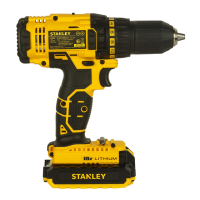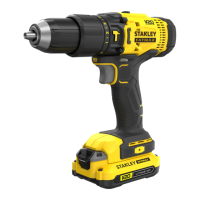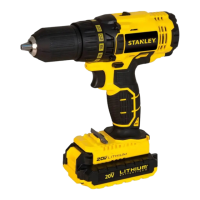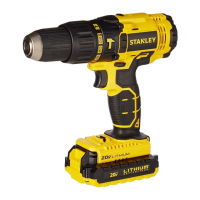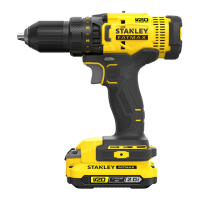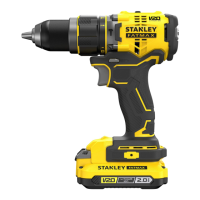e. Maintain power tools. Check for misalignment or
binding of moving parts, breakage of parts and any
other condition that may affect the power tools
operation. If damaged, have the power tool repaired
before use. Many accidents are caused by poorly
maintained power tools.
f. Keep cutting tools sharp and clean. Properly maintained
cutting tools with sharp cutting edges are less likely to bind
and are easier to control.
g. Use the power tool, accessories and tool bits etc. in
accordance with these instructions, taking into
account the working conditions and the work to be
performed. Use of the power tool for operations different
from those intended could result in a hazardous situation.
5. Battery tool use and care
a. Recharge only with the charger specified by the
manufacturer. A charger that is suitable for one type of
battery pack may create a risk of fire when used with
another battery pack.
b. Use power tools only with specifically designated
battery packs. Use of any other battery packs may create
a risk of injury and fire.
c. When battery pack is not in use, keep it away from
other metal objects, like paper clips, coins, keys, nails,
screws, or other small metal objects, that can make a
connection from one terminal to another. Shorting the
battery terminals together may cause burns or a fire.
d. Under abusive conditions, liquid may be ejected from
the battery; avoid contact. If contact accidentally
occurs, flush with water. If liquid contacts eyes,
additionally seek medical help. Liquid ejected from the
battery may cause irritation or burns.
6. Service
a. Have your power tool serviced by a qualified repair
person using only identical replacement parts. This will
ensure that the safety of the power tool is maintained.
ADDITIONAL POWER TOOL SAFETY WARNINGS
Warning! Additional safety warnings for
drills/screwdrivers
• Wear ear protectors when impact drilling. Exposure to
noise can cause hearing loss.
• Use auxiliary handles supplied with the tool. Loss of
control can cause personal injury.
• Hold power tool by insulated gripping surfaces when
performing an operation where the cutting accessory
may contact hidden wiring. Cutting accessory contacting
a "live" wire may make exposed metal parts of the power
tool "live" and could give the operator an electric shock.
• Hold power tool by insulated gripping surfaces, when
performing an operation where the fastener may
contact hidden wiring. Fasteners contacting a "live" wire
may make exposed metal parts of the power tool "live" and
could give the operator an electric shock.
• Use clamps or another practical way to secure and
support the workpiece to a stable platform. Holding the
work by hand or against your body leaves it unstable and
may lead to loss of control.
• Before drilling into walls, floors or ceilings, check for the
location of wiring and pipes.
• Avoid touching the tip of a drill bit just after drilling, as it may
be hot.
• The intended use is described in this instruction manual.
The use of any accessory or attachment or performance of
any operation with this tool other than those recommended
in this instruction manual may present a risk of personal
injury and/or damage to property.
SAFETY OF OTHERS
• This tool is not intended for use by persons (including
children) with reduced physical, sensory or mental
capabilities, or lack of experience and knowledge, unless
they have been given supervision or instruction concerning
use of the tool by a person responsible for their safety.
• Children should be supervised to ensure that they do not
play with the appliance.
Residual risks
Additional residual risks may arise when using the tool which
may not be included in the enclosed safety warnings. These
risks can arise from misuse, prolonged use etc.
Even with the application of the relevant safety regulations and
the implementation of safety devices, certain residual risks can
not be avoided. These include:
• Injuries caused by touching any rotating/moving parts.
• Injuries caused when changing any parts, blades or
accessories.
• Injuries caused by prolonged use of a tool. When using any
tool for prolonged periods ensure you take regular breaks.
• Impairment of hearing.
• Health hazards caused by breathing dust developed when
using your tool (example:- working with wood, especially
oak, beech and MDF.)
(Original instructions) ENGLISH
5
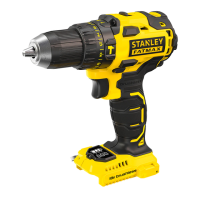
